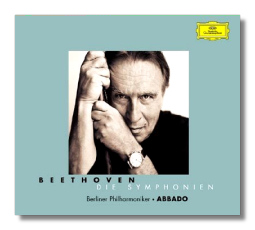
The Internet's Premier Classical Music Source
Related Links
- Beethoven Reviews
- Latest Reviews
- More Reviews
-
By Composer
-
Collections
DVD & Blu-ray
Books
Concert Reviews
Articles/Interviews
Software
Audio
Search Amazon
Recommended Links
Site News
 CD Review
CD Review
Ludwig van Beethoven

The Nine Symphonies
- Symphony #1 in C Major, Op. 21 (1800)
- Symphony #2 in D Major, Op. 36 (1802)
- Symphony #3 "Eroica" in E Flat Major, Op. 55 (1803)
- Symphony #4, Op. 60 (1806)
- Symphony #5 in C minor, Op. 67 (1807)
- Symphony #6 "Pastoral" in F Major, Op. 68 (1808)
- Symphony #7 in A Major, Op. 92 (1812)
- Symphony #8 in F Major, Op. 93 (1812)
- Symphony #9 "Choral" in D minor, Op. 125 (1824) *
* Karita Mattila, soprano
* Violeta Urmana, mezzo-soprano
* Thomas Moser, tenor
* Thomas Quasthoff, bass
* Eric Ericson Chamber Choir
* Swedish Radio Choir
Berlin Philharmonic Orchestra/Claudio Abbado
Deutsche Grammophon 469005-2 5CDs Recorded Live
What is most interesting about this set is the performance of the Ninth Symphony. It's not the quality of the reading that intrigued me at the outset – though it's an extraordinary one, to be sure – but the fact that Abbado recorded the work for Sony, with this same Berlin Philharmonic, in 1996 with a somewhat different approach. That recording featured bigger-name singers, too – Jane Eaglen, Waltraud Meier, Ben Heppner and Bryn Terfel – and clocked in at 66:00. This new DG effort was taped in April and May, 2000, and is a lean 62:19. In the end, it is the better of the two as well, with more intensity, less slickness, and greater consistency. Yet, it's not entirely different from the Sony, a well-played effort in its own right that was justly praised. In any event, this new one has the overall edge even if the singers are marginally less compelling. Abbado seems more alert to crucial details throughout, and the balances and instrumental timbres he draws from the Berlin players are truer.
It's not just the Ninth that features lean tempos – almost all the others here are briskly-paced, as well. I especially like Abbado's Eroica, which was the first symphony I listened to in the set, despite my curiosity about the Ninth. It is an intense reading whose 16:05 timing in the first movement, with repeat, comes as close to definitive (if such a thing could exist) as any recording or performance I've heard. The Fourth is also a success, with Abbado's tempo in the first movement's Allegro vivace main section brisk but never sounding too fast. The subsequent movements also come across with the requisite vitality and attention to detail.
The Fifth is a strong performance, but not as outstanding as, say, the Third. It is full of tension and drive in the first movement, and nothing is really amiss anywhere; yet it doesn't quite have that last ounce of grimness and power in the opening movement. Still, it's a mighty fine Fifth. The Sixth is another nearly flawless reading, capturing the bucolic nature of the work in brilliant colors and vivid imagery. The third movement storm comes off brilliantly: you're apt to seek shelter from the thunder and downpour, while your ears receive perverse delights amid the sonic mayhem.
The Seventh begins with a quicker tempo in the introduction as is becoming common these days. Again, it's a fine performance, with rhythms both muscular and well-accented, but without overemphasis on them to the work's detriment. After all, everyone knows what the symphony's about and Abbado keeps things subtle and ever tasteful. The bright colors of the Eighth come through brilliantly here, again with brisk tempos and well-gauged balances.
Since I began with the Ninth, I guess it's only appropriate that I close with the First and Second. Abbado interprets both with the wise view that Beethoven hadn't quite hit his compositional maturity in this pair. Thus, he doesn't plumb the scores for angst or grimness that isn't really there. In the end, both are splendid readings.
The Berlin Philharmonic is in fine form throughout, bringing out the subtle detail that Abbado demands, and offering balances and individual playing on the highest level. The sound provided by Deutsche Grammophon is excellent, as are Beethoven scholar Joseph Kerman's notes. My previous favorites in the Beethoven Nine symphonies have included Szell (Sony), Jochum (EMI), Harnoncourt (Teldec), Bernstein (DG), and Drahos (Naxos). I am not familiar with Abbado's Vienna Philharmonic cycle from the 1980s.
If I have to pick one set to take to a desert island, this new Abbado album would be my choice. He gets a much better sound in Beethoven out of the Berlin Phil than did his predecessor, Karajan, whose legato-laden phrasing could be maddening at times. This set is perhaps Abbado's greatest accomplishment in his tenure in Berlin. He'll soon be stepping down, with Simon Rattle his appointed successor. By the way, there's an interesting interview with Abbado contained in the album booklet, wherein the maestro discusses many facets of these symphonies, including Beethoven's tempo markings, matters of instrumentation, and much else. Also, for whatever it's worth, Abbado uses the rather new Bärenreiter edition, which to some is a more authentic treatment. However, few, if any, will notice any difference between this and more traditional editions.
Copyright © 2001, Robert Cummings




















